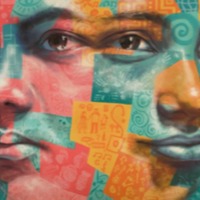
My journey to Libya, I remember it was in July, we were 850 people. We were divided in five cars. 160 people in one car. We spent a month in the Sahara. We were drinking water from bottle caps. You remember, it was all over the media then. So many died, there were many who weren’t even buried. So many died on the way, it was very bad and very difficult. You'd be beaten if you begged for water. You'd be beaten if you tried to protect your sisters from being abused. They’d take our sisters and do bad things to them. It wasn’t easy. The traffickers did many bad things. Even the brokers that you thought were your brothers and that you trusted to help you depart would do bad things to you. They might even sell you.
It was very difficult, you know how it was. Kidane, you stayed in Libya for two years. You know what life was like there, eating boiled macaroni every morning. We've all be through that.
Being locked inside for a year where you can’t see the sun. Where you get lice and skin diseases all over your body. With no water to drink or even wash yourself with. You know how difficult it was.
And having gone through all this you saw how much fear we had of the sea. Yet you would be so eager to go to sea. To escape from that life, where sometimes you wished God would take your soul.
[…]
We came to the sea and were put in a useless boat made of wood. It started to leak once we’d departed. The three of us departed together. We remember how it started to leak immediately after departure and how we tried to bail out the water using water bottles the whole journey. We were on the same boat, and it was God’s will that we made it together. Together we saw what the journey on the boat was like. We all have the scars. We’ve been through difficulties in Libya and Sudan. It was going from bad to worse.
We lost brothers and sisters during the sea journey. You remember them. May their souls rest in peace. They didn’t achieve what they wanted. The only thing we can do is to pray for them. Many Eritreans died in the sea. They had to flea many problems and had no other choice. They departed after paying a lot. They mothers who had nothing had to sell their gold. But they didn’t succeed and died in the sea, and their mothers are grieving.
[…]
You're right, all Eritreans have scars from their journeys in exile. Scars from the past and from all the difficulties and challenges.
[…]
We want to say it’s enough. Enough with taking the Libya route. It should stop with us. And for such bad things not to happen to our brothers, I wish those responsible would do something about it. Now, what we should do is advise the Eritreans who are motivating others to take this route not to behave that way towards their countrymen.
Narrative produced by Telling the Real Story, an initiative facilitated by UNHCR The UN Refugee Agency
Original narrative can be found at https://www.tellingtherealstory.org/en/stories/video/three-eritreans-story/









